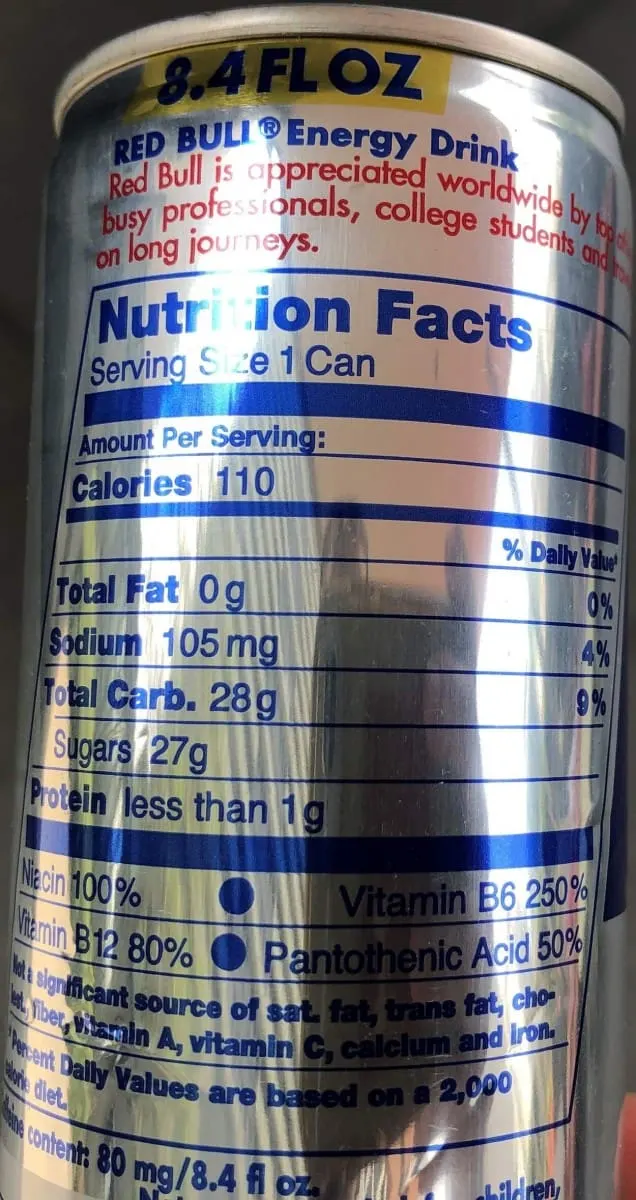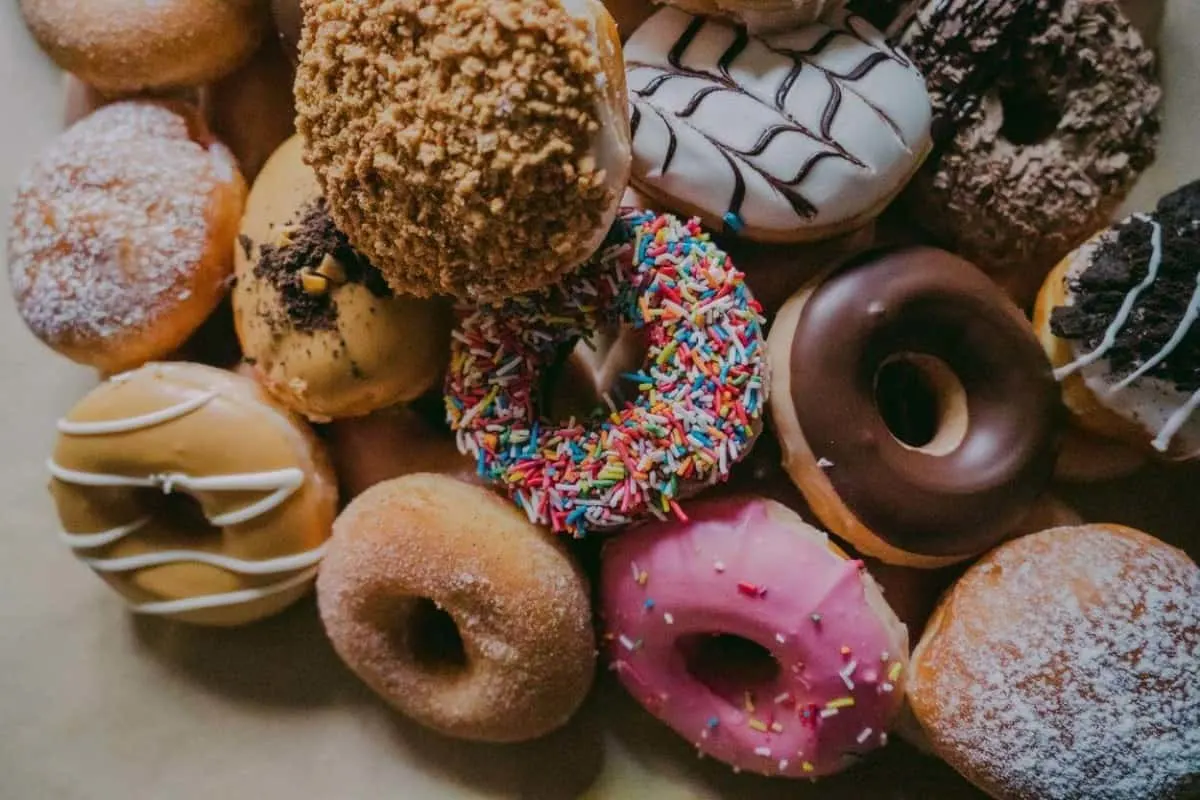
Red Bull and coffee contain about the same amount of caffeine. So if you’re looking to change your morning routine, Red Bull could be a good coffee substitute.
Red Bull is a popular energy drink that sells over 7 billion cans worldwide yearly.
Its famous tagline “Red Bull Gives You Wings” earns the brand a large customer following.
But does this mean Red Bull is better than coffee, our oldest and most trusted energy boosting drink?
Let’s find out!
Let’s begin by comparing coffee and red bull’s nutrition facts.
Page Contents
Red Bull vs. Coffee: Nutrition Facts

Let’s take a closer look at the nutritional information of each beverage to see how close the figures are.
For this comparison, I am using the regular 8.4 oz Red Bull instead of the sugar-free version because the former is generally more accessible.
| Nutrients | Red Bull (8.4 oz/248 ml) | Black Coffee (240 ml) |
| Caffeine | 75 mg | 96 mg |
| Calories | 110 | 2 |
| Protein | 1 gram | 0 g |
| Sugar | 27 grams | 0 g |
| Magnesium | 12% of the Daily Value (DV) | 2% of the DV |
| Thiamine | 9% of the DV | 0 |
| Riboflavin | 21% of the DV | 11% of the DV |
| Niacin | 160% of the DV | 2% |
| Vitamin B6 | 331% of the DV | 0 |
| Vitamin B12 | 213% of the DV | 0 |
| Potassium | 0 | 3% of the DV |
In terms of nutrition facts, Red Bull has a comprehensive nutrition facts label that you can inspect on its packaging. However, coffee is a little harder to estimate because its nutrition facts depend on the brew and additional ingredients.
The values of black coffee that you can see here are based on my research. This is helpful as a general guide depending on how you take your coffee but do not take it as an exact reference.
As you can see from the table, the two beverages have a close amount of caffeine level. In fact, coffee is 21 mg stronger than regular Red Bull.
But aside from that, the two beverages widely differ in terms of calorie and sugar content.
Red Bull vs. Coffee: Calorie Content

Red Bull contains 110 calories, while coffee only has two calories.
To put things into perspective, calories are the amount of energy we get from the food and beverages that we consume.
The daily calorie intake of healthy adults is 2,000 calories a day for women and 2,500 for men.
So while 110 calories seem like a lot, it is still within the healthy limit. However, if you’re concern about your calorie intake, then black coffee is a much better alternative because it has minimal calories.
For your reference, here is a comparison of the calorie content of other kinds of coffee.
| Coffee Drinks | Calories (per 8 ounces) |
| Iced Black Coffee | 2 |
| Espresso | 20 |
| Cold Press(nitro cold brew) | 2 |
| Brewed Coffee from Flavored Beans | 2 |
| Coffee with 1 tbsp (15ml) of french vanilla creamer | 32 |
| Coffee with 1 tbsp (15ml) of skim milk | 7 |
| Coffee with 1 tbsp (15ml) half and a tsp. of sugar | 38 |
| Nonfat latte | 72 |
| Flavored Latte | 134 |
| Non-Fat Cappuccino | 46 |
| Non-Fat Macchiato | 52 |
| Non-Fat Mocha | 129 |
| Non-Fat Frozen Coffee Drink | 146 |
| Bulletproof Coffee with 2 cups (470 ml) of coffee, 2 tbsp. (28 grams) of butter and 1 tbsp (14 grams) of coconut oil | About 325 |
As you can see, flavored latte and non-fat frozen coffee have the highest amount of calories.
The more sugar or creamer you add to your sugar, the higher the calorie level would be.
Red Bull vs Coffee: Sugar Content
Red Bull contains 27 grams of sugar, which is above the recommended amount, especially for women.
According to AHA, the added sugar limit should be no more than 24 grams of sugar for women and no more than 36 grams of sugar for men.
Red Bull has a sugar-free version with a slightly higher caffeine level at 80 mg. Although this variant is technically healthier with fewer sugars, you should only opt for this version if you can handle 80 mg of caffeine.
Remember that the values we use for black coffee are without added sugar or creamer, so it’s essential that you also watch how many teaspoons of sugar you add to your coffee.
According to the recommended daily limit, sugar intake should not be more than 6 teaspoons of sugar for women and 9 teaspoons for men.
Still unconvinced about which to choose? Watch the video below to have a second opinion on Red Bull or coffee.
How Bad Is Red Bull Compared to Coffee?
Red Bull isn’t bad, but it definitely doesn’t seem like the healthier alternative when compared to black coffee.
That is because Red Bull has high sugar levels that go beyond the daily limit for women. Because of its high amounts of sugar, it poses a greater risk of health complications as a result of excess sugar consumption.
The 27 g of sugar in Red Bull is above the 24 g limit for women.
It might just be a few grams, but if you consume other foods high in sugar throughout the day, the sugar will accumulate in your body and will likely lead to the following symptoms:
- increased hunger and weight gain
- increased risk of heart disease
- increased risk of Type 2 Diabetes
- heightened-risk of depression
- accelerated aging process
- irritability
- fatigue and low energy levels
- craving for sweets
- high blood pressure
- acne and wrinkles
- joint pain
This is why it is best that you limit your consumption to one can per day.
Now, let’s move on to other commonly asked questions regarding coffee and energy drinks.
Is it Better to Drink Coffee or an Energy Drink?

The answer is “it depends!”
For a general energy boost, it is better to drink coffee because you have more control of the amount of sugar that goes into your drink.
But if you want a greater amount of supplements, go for Red Bull.
Aside from the nutrition facts, the ingredients list of Red Bull tells us that it contains taurine, which is an amino acid that lowers blood pressure and calms the nervous system.
Taurine is a great supplement that provides the body with various health benefits. Among others, taurine performs vital functions to the body such as:
- protecting the eyes
- promotes healthy metabolism
- strengthens muscle
- protect against brain aging
- regulating calcium levels in certain cells
- creating bile salts
- balancing electrolytes in the body
- supporting the development of the nervous system
For your reference, listed below is the ingredients list of Red Bull.
- Carbonated Water
- Sucrose
- Glucose
- Citric Acid
- Taurine
- Sodium Bicarbonate
- Magnesium Carbonate
- Caffeine
- Niacinamide
- Calcium Pantothenate
- Pyridoxine HCI
- Vitamin B12
- Natural and Artificial Flavors
- Colors” (“Red”)
Aside from these aforementioned nutrients, Red Bull also has more B-Vitamins than coffee.
Red Bull has five types of B-Vitamins mainly B1, B2, B3, B6, and B12, while coffee only contains two which are B2 and B3.
Here are the health benefits provided by each type of B-Vitamin.
| Types of B Vitamin | Name | Benefits |
| B1 | Thiamine | help in digesting fats |
| B2 | Riboflavin | fights free radicals |
| B3 | Niacin | good for skin health |
| B6 | Pyridoxine | promotes healthy metabolism |
| B12 | Cobalamin | aids in the production of red blood cells and nerve cells |
How Many Cups of Coffee is Equal to a Can of Red Bull?
In terms of caffeine level, one cup of coffee is equal to one can of Red Bull.
It is a tasty, chilled alternative to coffee, which easily explains its popularity as an energy drink.
In fact, according to Red Bull’s website, the beverage contains the same amount of caffeine as coffee and the same amount of sugar as apple juice.
Its manufacturer endorses Red Bull as an everyday drink that is a perfectly healthy alternative to your usual caffeinated beverages.
However, it’s not healthy overall because of its high sugar content. The sugar in Red Bull exceeds the recommended daily sugar intake for women.
To avoid health complications, you should not consume more than one can of Red Bull per day.
Aside from that, it would be best to cut sugary foods and beverages for the day after drinking Red Bull to avoid the symptoms of excessive sugar consumption.
Red Bull vs Coffee: Which is Best For Studying?

Both beverages contain caffeine which will help you focus while studying. But Red Bull is slightly better than coffee because it has taurine, which improves cognitive function.
Red Bull has a slight advantage over regular coffee because it has taurine, which is another supplement that supports brain function.
Personally, I think both are good choices to support your body and brain function while studying.
Caffeine has natural properties that improve brain function, memory, and alertness, which is exactly what you need if you’re going to pull an all-nighter studying.
In fact, a study also found that a dose of caffeine after studying may help increase long-term memory and retention.
I have experienced improved alertness and concentration for about one to two hours after consuming Red Bull or coffee. There is no anxiousness or panicky feeling because the amount of caffeine is minimal.
To help you prepare more for studying or pulling all-nighters, here are some brain foods you can try:
- berries
- citrus fruits
- dark chocolate and cocoa products
- nuts
- avocados
Why is Red Bull more effective than coffee?
Red Bull is more effective than coffee because of its different ingredients. Energy drinks like Red Bull are often marketed as being more effective than coffee due to their added ingredients such as caffeine, taurine, and B-vitamins, as well as sugar and creatine.
The combination of these ingredients, along with sugar and other stimulants, are claimed to provide a more intense and sustained energy boost than coffee alone. However, the exact effects can vary between individuals and it is important to be mindful of consuming energy drinks in moderation.
Why do energy drinks work better than coffee?
Energy drinks pack caffeine, taurine, B vitamins, and sugar for a quick boost. Energy drinks like Reign are convenient and can be quickly consumed on the go. In contrast, coffee is typically a social drink that is meant to be slowly sipped and enjoyed.
The effectiveness of energy drinks compared to coffee can vary from person to person and depends on individual tolerance and sensitivity to caffeine and other ingredients. Energy drinks often contain caffeine, taurine, and other compounds that can enhance energy levels and mental alertness.
What is better for you Red Bull or coffee?
The health effects of Red Bull and coffee can differ based on their ingredients and consumption patterns. Red Bull is an energy drink that typically contains caffeine, taurine, and other additives, while coffee is made from coffee beans and contains natural caffeine.
Moderation is key for both beverages. Coffee, when consumed in moderate amounts, can offer certain health benefits, including antioxidants and potential improved cognitive function. On the other hand, excessive consumption of energy drinks like Red Bull can lead to adverse effects like increased heart rate, nervousness, and difficulty sleeping.
Does Red Bull make you feel better?
Red Bull, like other energy drinks, contains caffeine, which is a stimulant that can temporarily boost alertness and energy levels. Some individuals may experience a short-term increase in focus and mental clarity after consuming Red Bull, especially if they were feeling fatigued or drowsy before.
However, it’s important to note that any positive effects from Red Bull are typically temporary and may vary among individuals. Excessive consumption of energy drinks can lead to negative side effects, such as jitteriness, increased heart rate, and difficulty sleeping.
In Conclusion
In sum, Red Bull and coffee contain the same amount of caffeine which makes the former a viable substitute for coffee.
Both have caffeine amounts that range from 75 to 96 mg which is considered average in strength.
Although coffee and Red Bull are comparable, they differ in sugar, calorie, and supplements.
Coffee has a lower number of sugar and calories, while Red Bull has a surplus of nutrients not found in coffee.
Most energy drinks are heavily enriched with different supplements like amino acids so Red Bull has a greater advantage when it comes to nutrition content.
You just need to limit your consumption to one can of Red Bull a day because it has a high sugar level that exceeds the suggested limit.
Consuming a second can will increase the chance of developing health ailments from excessive sugar consumption.
Read this article to find out how many cans of Red Bull is ideal to consume in a day.
Honestly, both are great choices and the best choice depends on your needs, preference, and level of activity.
If you want a normal energy-boosting beverage without worrying about the preservatives, choose coffee. But if you’re looking for an alternative that is packed with vitamins and nutrients, go for Red Bull.
That’s it for me, I hope you’ve learned important points from this article!
Don’t buy Red Bull before you check out my complete buying guide. It will help you get the best deal and make sure you don’t pay too much.
